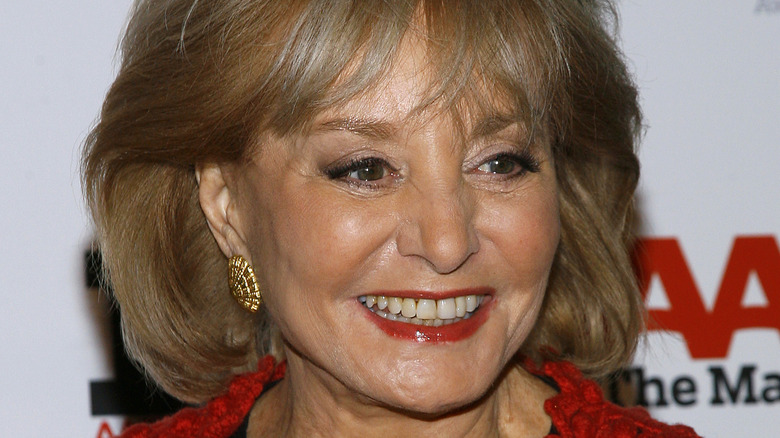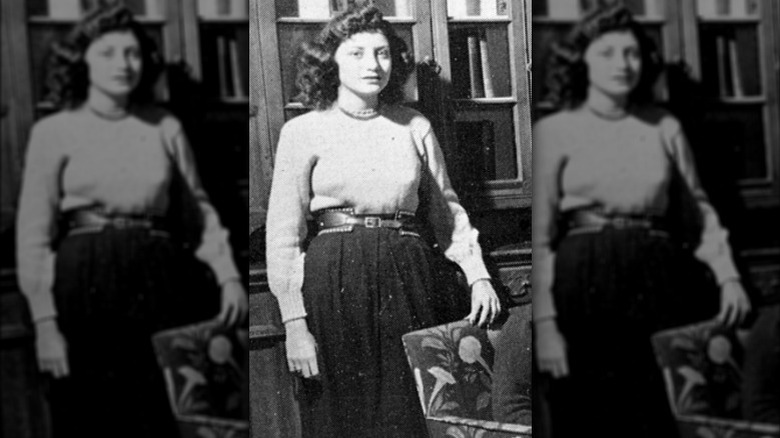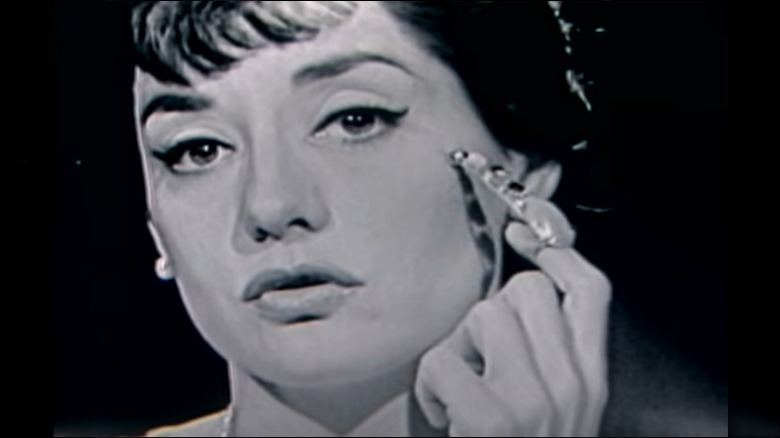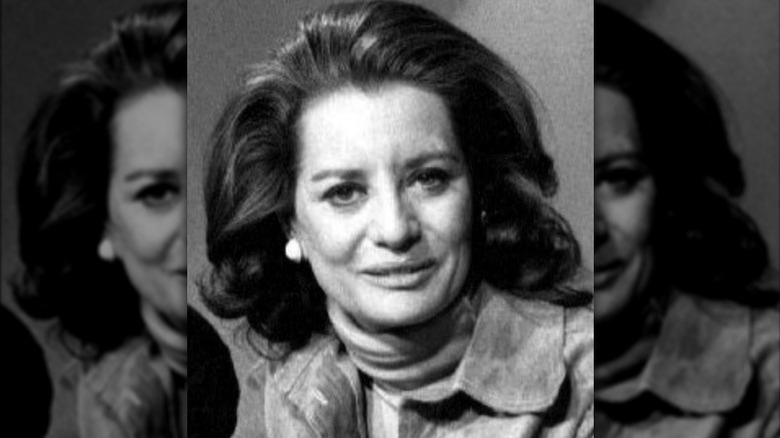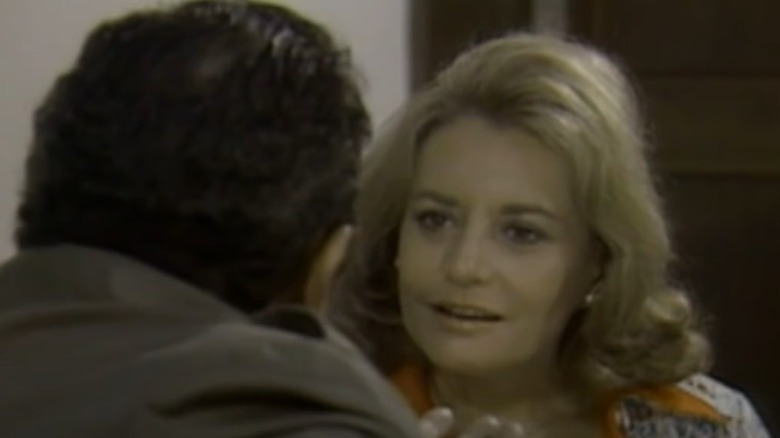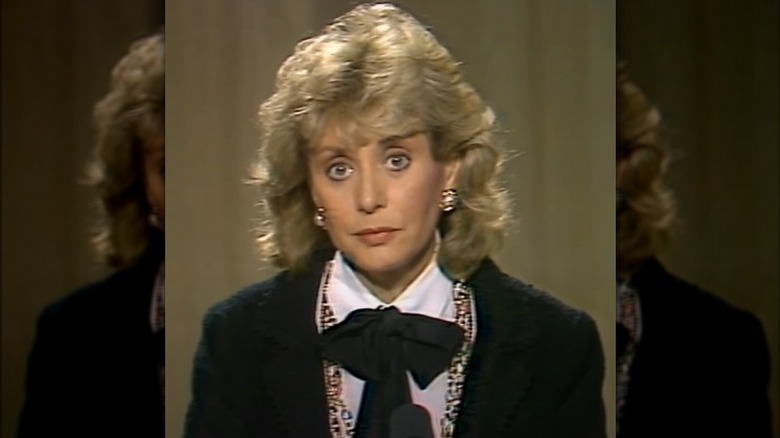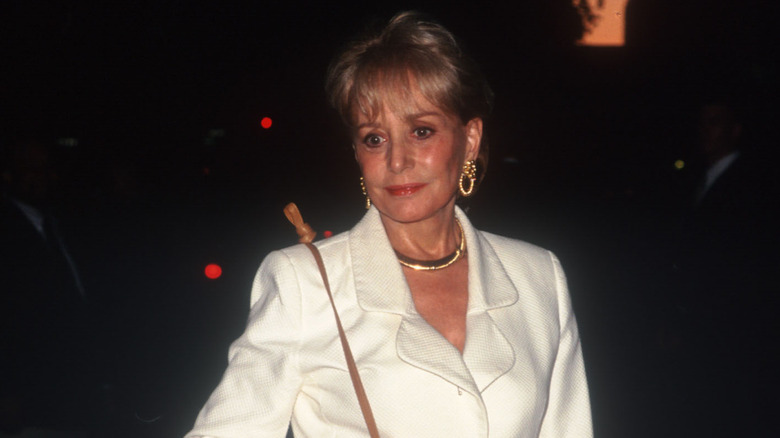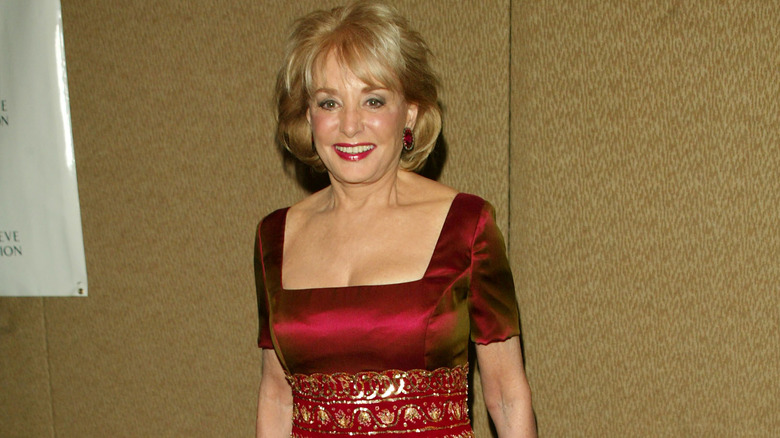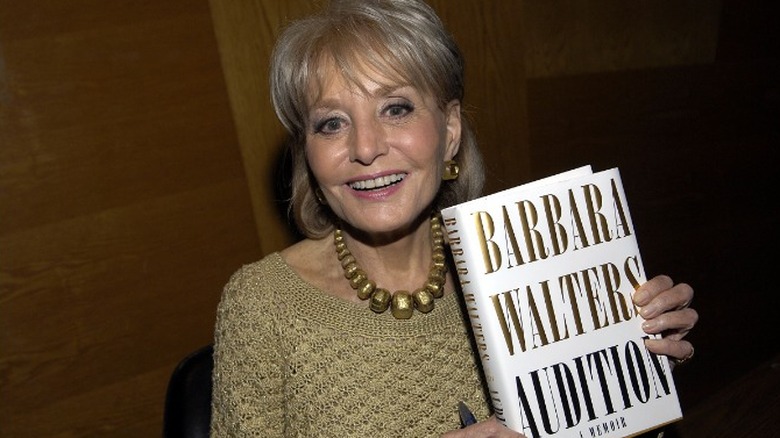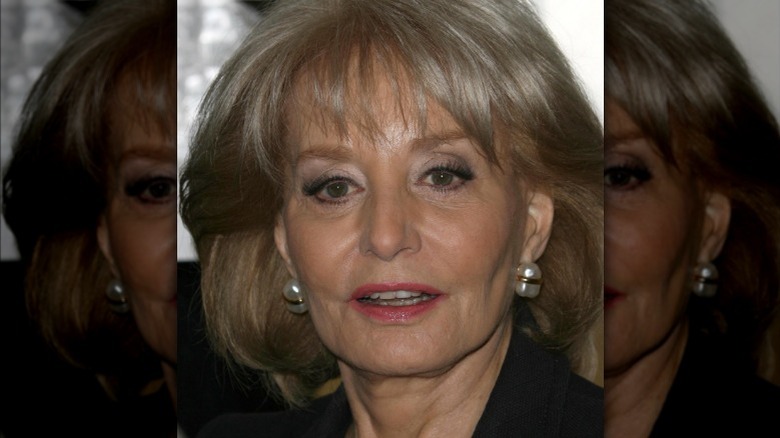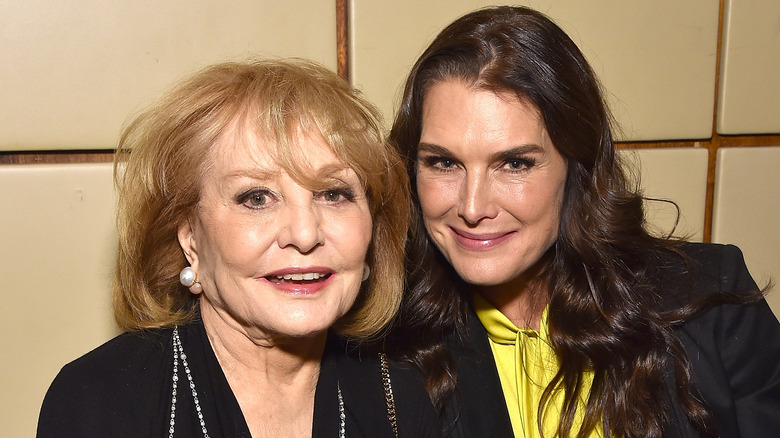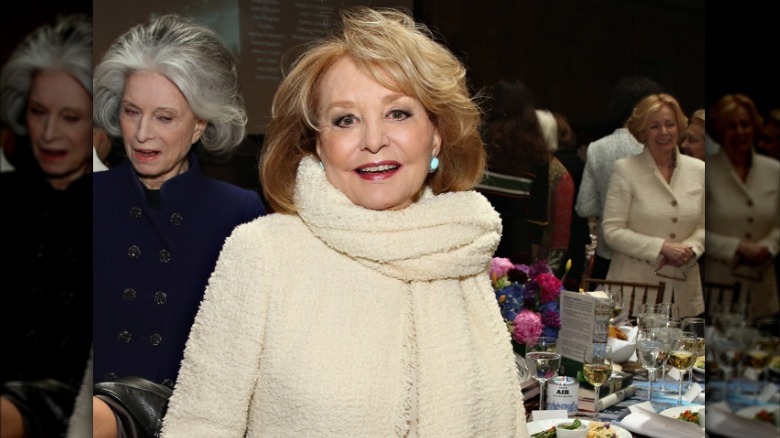The Transformation Of Barbara Walters From High School To 92 Years Old
Nowadays, Barbara Walters is perhaps best known for starting "The View" — and asking questions during interviews that some people consider inappropriate in today's social climate. But before she was daytime television's fairy godmother, she was an icon of TV journalism known for securing interviews with incredibly high-profile entertainment and political luminaries.
Walters has been in the public eye since she ascended from a production position to appearing on-air in 1961, according to the Jewish Women's Archive. Back then, television news was incredibly male-dominated, and Walters would go on to make history as the first woman to anchor a nightly news show, in addition to winning many other accolades.
In her 60 years of working in television, she left her mark in daytime talk TV, nightly news, and more. Walters left "The View" in 2014, citing an understandable urge to retire at 84 years old, per Variety. Now that Walters is in her 90s, here's a look back at her remarkable career.
Barbara Walters' early life
Nepotism is nothing new; lots of celebs have successful parents, and Barbara Walters is no exception. Her dad, Lou Walters, was a nightclub owner who became so famous, The New York Times devoted a lengthy obituary to him after his death by heart attack in 1977. His club, the Latin Quarter, attracted big talent including Frank Sinatra and Mae West.
Barbara was "a shy, bookish schoolgirl among the brassy dames" in the venue, according to The New Yorker, but while she had a largely privileged childhood surrounded by the glitterati, it wasn't without difficulty. She wrote in her memoir, "Audition," that her older sister Jacqueline's mental disabilities led other kids to ostracize both of them. "It was a lonely, isolated childhood," Barbara told AP (via Today). She also felt envious of how her mother doted on Jacqueline, she confessed to SFGate, but in time she would consider Jacqueline "the most significant person" in her life. Still, her feelings for her sister were complicated. "I felt love for her but also pity, and there were times when I hated her and felt terribly guilty," she said.
Thanks to her father's success, Barbara's family could afford a top-of-the-line education for their kids. She attended the private Birch Wathen school in New York City, according to The New York Times, and then went to the prestigious Sarah Lawrence College in 1947. Walters donated $15 million to the latter in 2015, per Philanthropy News Digest, resulting in a student center being named after her.
Her personal life has been tumultuous
After Barbara Walters graduated in her early 20s, her family's fortune all but disappeared. "I mean we lived in enormous luxury — penthouses, trips to Europe, everything," she told NBC News. "And then my father lost it all." She attributes her solid work ethic to this riches-to-rags transition. "I had to support my family," she said. But while she went on to make history as an anchor and TV journalist, she confessed to ABC News, "I don't think I was very good at marriage."
She wed businessman Robert Henry Katz in 1955, according to Closer Weekly, but the union only lasted two years. She married Lee Guber, who produced Broadway shows, in 1963 and stayed with him until 1976. Finally, she married Lorimar CEO Merv Adelson twice: from 1981 to 1984 and 1986 to 1992. Despite the ups and downs, she told Vanity Fair in 2013, "I have no regrets."
She also experienced some heartache while trying to conceive. She opened up to Oprah Winfrey about the three miscarriages she endured before finding a happy ending when she adopted her daughter Jacqueline, who she named after her sister, per ABC News. She recalled finding out about the opportunity to adopt Jacqueline from acquaintances. "They had lawyers out of state who were looking for this little boy," she said on "Oprah's Master Class." "They wanted a boy who was going to be tall and had blue eyes and fair hair. They didn't want the girl. We said, 'We'll take the girl!'"
She was called one of TV's 'most familiar' faces
After a short stint in public relations, Barbara Walters became a writer for "The Today Show" and was eventually put on the air, staying for 13 years, she said on "The Oprah Winfrey Show." Then, in 1976, she became the first female nightly network news anchor. "It was the biggest news ever," Winfrey said, "because they were going to be paying her a million dollars."
But Walters experienced sexism plenty of times throughout her career. At "Today," co-anchor Frank McGee was incensed that Walters was receiving the same opportunities as him, she told The New York Times. And even in her history-making turn as a nightly news anchor, "I was an enormous flop," Walters told Winfrey. "Harry Reasoner [her male co-anchor] did not want a partner."
When asked whether she felt she was paving the way for women, Walters told Winfrey, "No. I never felt that I was waving banners. I mean, I was not Gloria Steinem." She added, however, that she loved giving one piece of advice to younger women in their field: "Be so good ... that you become invaluable."
She nabbed an interview with Fidel Castro
Barbara Walters was undeterred by her cranky male colleagues' disdain. She continued to work her way up the TV news ladder, and eventually, she was nabbing interviews with the most controversial political players in the world.
One of Walters' biggest accomplishments was clinching a 1977 interview with Cuban dictator Fidel Castro, who, "for some unknown reason, singled" Walters out from a pool of reporters when she was visiting Havana, according to her memoir, "Audition." She suspected that he knew her because the "Today" show reached Cuba. When she had "a few private minutes with Castro," she writes, she asked him for an interview and he surprisingly agreed. It took two more years and "countless letters" reminding him of the meeting he'd agreed to, but she eventually sat down with Castro, and their interview aired on ABC.
The same year, Walters persuaded Israeli Prime Minister Menachem Begin and Egyptian President Anwar Sadat to meet with her in a "historic joint interview," per HuffPost. At the time, Egypt didn't recognize Israel's statehood, Walters explains in her memoir, and the two countries had been at war just a few years earlier. For Sadat and Begin to share an interview space with Walters was revolutionary.
The '80s saw her moderating a presidential debate
Barbara Walters' star continued to steadily climb through the 1980s. The decade saw her reprising her role as a presidential debate moderator after first having overseen a debate between Jimmy Carter and Gerald Ford in 1976.
The selection of Walters for the Carter-Ford debate happened at a time when her co-anchor, Harry Reasoner, was taking swipes at her on-air because he didn't want a partner, according to her memoir, "Audition." "I don't know whether the [League of Women Voters] chose me out of pity or because they thought I would do a good job, but boy, did I need that vote of confidence," she writes. She did so well that she was granted the role again in 1984. This time around, incumbent Ronald Reagan was trying to fend off challenger Walter Mondale, and Walters' involvement was historic; per Axios, it was the first time a woman has moderated the first presidential debate. As of this writing, no other woman has done the same.
Walters received a few more votes of confidence as the 1980s continued, culminating in her induction in the Television Academy Hall of Fame in 1989. "My advice is very simple," she said at the telecast celebrating her induction. "Work as hard as you can. Sometimes that means working harder than everybody else. And if you should fall, stand again, because that fall may be the beginning of the best years to come."
She interviewed Michael Jackson in 1997
Shortly after Diana, Princess of Wales, died in a Paris car crash, Barbara Walters sat down with Michael Jackson in what The Guardian described as "an interview of candid weirdness that is beloved [by] many Jackson fans even as other observers see it as a remarkable portrait of a star with little grip on reality."
Among the interview's memorable moments were Jackson recounting how Diana had asked him to put "Dirty Diana" back into his show after he'd taken it out in deference to her and his emotional reaction when he was asked about Diana's death. Jackson spoke of his own issues with the paparazzi and complained about his nickname, "Wacko Jacko." He also insisted he hadn't egged on the press with "mysterious behavior."
Jackson revealed that he feared for his own life after Diana died and implied that he'd foreseen the death of Mother Theresa just a few days later. When Walters asked him if he thought he was psychic, he suggested he might be. The interview was a major "get" for Walters, according to the Daily News, and frequently made lists of her most famous and infamous sit-downs.
Barbara Walters kicked off a new era with The View
Daytime talk shows boomed in popularity throughout the 1980s and 1990s. Coming up with a fresh format for the genre couldn't have been easy. But Barbara Walters reinvented chat shows in 1997 when she helped launch "The View" on ABC.
"I've always wanted to do a show with women of different generations, backgrounds and views," Walters says in the show's opening credits, per The New York Times. "This is that show." The first season's roster of co-hosts included Meredith Vieira, Star Jones, Debbie Matenopoulos, Walters herself, and Joy Behar. The show was considered groundbreaking not just because of its multi-host format, according to The New York Times, but because the women weren't "bubbleheads." "In a move that is both savvy and generous, [Walters] has surrounded herself with women who are able to hold their own with her and one another," the publication's review of the show read.
"The View" would undergo many permutations over the years — and endure front-page controversies. From Rosie O'Donnell and Elisabeth Hasselbeck's 9/11-era feud over the war in Iraq to Whoopi Goldberg's suspension over comments on the Holocaust, Walters created a hit and a pop-culture staple that has been going strong for more than two decades.
Her 2008 memoir revealed how she nabbed high-profile interviews
Barbara Walters decided to chronicle her life for a memoir called "Audition" in 2008. "I wanted people to know that my life, too, has had not just great ups, but also great downs," she told NPR about her decision to write the book.
The New York Times called the tome a "portrait of a deftly calculating woman with an impeccable sense of timing" and revealed that Walters gave away a few tools of the trade in its pages, starting with an early career triumph: her reporting on the sinking of an ocean liner. "What a horrible experience you've been through," Walters remembered saying to survivors. "You must be feeling terrible. But could you come into our studio tomorrow morning at 7 a.m. to tell us about it?" Making friends with a president is also a great way to score big "gets." After Walters joked around with former president Richard Nixon about "sex discrimination" in 1969, he helped her score a sit-down with Prince Philip that she'd had no luck getting herself. In fact, she described Nixon as "one of my greatest champions."
Walters shared many other examples of similar payoffs from her ability to charm power players and what The New York Times described as her "ladylike persistence." The memoir became a best-seller, according to Publishers Weekly.
She apologized for a conflict of interest in 2012
As Barbara Walters noted in "Audition," her process for scoring interviews often included letter-writing and friendly communication with potential subjects — and she also sometimes remained friends with interviewees for years or decades afterward. In fact, Egyptian President Anwar Sadat's widow Jehan Sadat once told her, "You know, you were the only one I was ever jealous of because Anwar liked you so much," Walters wrote.
So it's not completely surprising that on at least one occasion, some felt her friendship with a source may have gone too far. After Walters interviewed then-Syrian President Bashar al-Assad in 2011, "it emerged that she had offered to speak favorably" about one of Assad's aides, per CTV News. Walters had offered to help the aide clinch a CNN internship and a spot in Columbia University's journalism school in New York City.
"In retrospect, I realize that this created a conflict and I regret that," she said at the time. Still, some thought she hadn't done anything wrong because she hadn't offered the aide this assistance ahead of time as a precursor to the interview, per The Washington Post. "Walters appears to have been just doing a solid for someone who'd gotten her one of the year's best interviews. ... Good for her," the outlet wrote.
Her interviewing tactics came under scrutiny
There have been several instances when Barbara Walters' past interviews were scrutinized anew.
Ricky Martin, for instance, said an interview with Walters actually traumatized him because of the way she pushed him to come out of the closet on air in 2000. "You could stop these rumors," she had said to him at the time, per People. "You could say, 'Yes I am gay or no I'm not.'" He responded, "I just don't feel like it." Martin confessed to People years later, "When she dropped the question, I felt violated because I was just not ready to come out. I was very afraid. There's a little PTSD with that." Walters apologized, telling the Toronto Star in 2010, "When I think back on it now, I feel it was an inappropriate question."
Model Brooke Shields also took Walters to task years after they spoke. Shields appeared on Dax Shepard's "Armchair Expert" podcast, and he called her interview with Walters in the 1980s "maddening." Walters had asked Shields for her body measurements. The topic at hand was the infamous Calvin Klein ad in which Shields stated, "You want to know what comes between me and my Calvins? Nothing," per NBC News. Shields was only 15 at the time and hadn't realized that the ad was playing on sexual innuendo, she said. Shields added that her sit-down with Walters was "practically criminal," adding, "It is not journalism."
Reports claim she's battling dementia
After she retired from "The View" in 2014, Barbara Walters' public appearances gradually came to an end. TMZ reported in 2017 that she had stopped leaving her apartment in New York and had "become increasingly forgetful and confused," according to unnamed sources. Rosie O'Donnell told Us Weekly at a 2019 event that her former boss wasn't "up to speaking to people now," adding, "I think she's a wonderful woman, and it's hard to age in America, never mind if you're internationally famous."
Meanwhile, Radar Online reported that Walters hadn't seen some of her friends in years, and OK! magazine quoted sources who claimed that she'd been diagnosed with advanced dementia.
In 2021, a doorman confessed to the Daily Mail that he hadn't seen Walters leaving or entering her residence in a while. But her hairstylist, Bryant Renfroe, told the outlet she's just relaxing after decades of hard work and denied the reports about her declining health, saying that her "mind appears sharp" to him. "Why travel now when she's been everywhere," he said. "At this stage of her life, I'd have to say she's most comfortable staying close to home."

